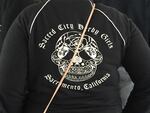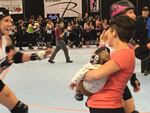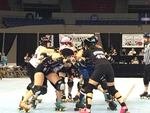
London Rollergirls (black) compete against the Arch Rival Roller Derby at the 2016 International Championships of the Women's Flat-Track Derby Association in the Veterans Memorial Coliseum.
Rob Manning / OPB
Roller derby players and fans rolled into Portland from thousands of miles away this weekend for the world championships. The main event is a 12-team tournament, supervised by the Women's Flat Track Derby Association, but there's a four-team tournament "Division 2" bracket as well.
Among the teams expected to do well is Portland's Rose City Rollers, which won the 2015 championship after years of dominance from New York-based Gotham.
Flat Track Roller Derby is a five-on-five physical sport. The general point is for a team's four blockers to assist their jammer, while preventing the other team's jammer from advancing.

Fans line up at Veterans' Memorial Coliseum for the 2016 International Champions of the Womens Flat-Track Derby Association. The tournament drew fans and teams from as far as England and Australia.
Rob Manning / OPB
“There’s one jammer from each team with a star on their helmet and they get through the pack, and each person’s hips that they pass, they get a point," explained 10-year-old Natalie, who came to Portland from Atlanta, with her mother Wendy Johnson, to watch the championship tournament.
Natalie plays in Atlanta's junior league, while her mom plays for the city's Jukes of Hazzard club. Natalie noted that there are leagues for kids as young as seven — and for men, as well as women.
The nearest team to Atlanta to qualify for the women's championship tournament in Portland was the Jacksonville RollerGirls, but Natalie said they'd probably cheer for Gotham, or the hometown Rose City Rollers.
The sport is growing and is now played on six continents, according to WFTDA officials, though most of the best teams are in the U.S.
But Saturday's first bout demonstrated how strong European teams have become, as the London Rollergirls overpowered the Arch Rival Roller Derby of St. Louis, 197-94. After a brief lead for Arch Rival, London opened a lead in the first 30-minute half and never looked back through the end of the bout.
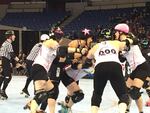
The London Rollergirls jammer (in black, with pink star on helmet) attempts to break through the Arch Rival Roller Derby blockers at Veterans Memorial Coliseum, during the WFTDA championships.
Rob Manning / OPB
A small raucous cheering section next to the oval track relentlessly shouted encouragement — mostly to the St. Louis club — even as Arch Rival struggled to keep the bout close.
Roller derby may have expanded in recent years, but players and fans say there's a still a community feeling among players. It has a definite culture, from the cheering sections and jargon, to the nicknames that many players use.
London skater Master Blaster says it's large enough that players can find teams almost anywhere on the globe. But it's small enough that you can form and maintain relationships with teammates and competitors along the way.
“Players also move around and transfer teams," Master Blaster said. "It’s a really widespread scene, but it’s also really deep and when people fall in love with it, you fall in love with it for a really long time, and you build really lasting relationships. It’s one of the nice things about it.”
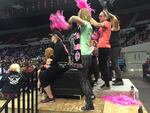
Fans of Arch Rival All-Stars and London Rollergirls cheer on their teams during a bout at the 2016 International WFTDA Championships in Portland's Veterans Memorial Coliseum.
Rob Manning / OPB
Players knew each other, even on teams as geographically distant as London and St. Louis. At one point during Saturday's bout, two players got tied up together, and after a typically rough separation at game speed, they gestured at each other, while still skating around the oval. They appeared to laugh it off later, during a time out. Turns out, they used to be teammates.
"I think that was Duke and Harmony and they both used to play together in Minnesota," Master Blaster recalled.
Master Blaster has also competed for a Berlin team, as well as in the US. She said playing for the Rollergirls in London was a big part of why she relocated there. She acknowledged that her situation is different from many players because she runs a skate-related business, making her personal and athletic lives more closely intertwined than other players'.


